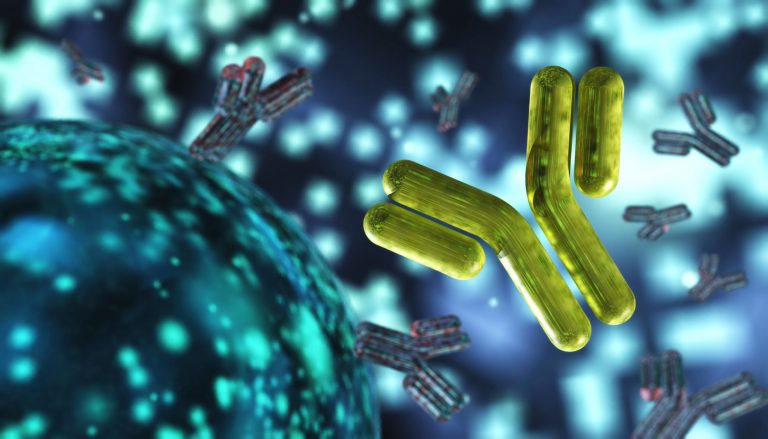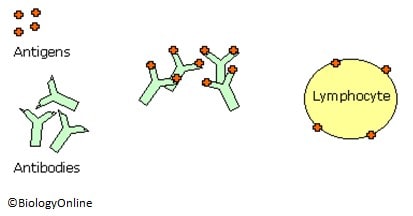Passive and Active Types of Immunity

3D rendering of an antibody
Table of Contents
The previous tutorial investigated the role of white blood cells in phagocytosis. White blood cells are also responsible for antibody formation. Certain antibodies are synthesized in response to the presence of certain antigens
Specific Immune Responses
Lymphocytes are a type of white blood cell capable of producing a specific immune response to unique antigens. Some of these lymphocytes are capable of entrapping antigens on their surface.
When lymphocytes catch these antigens they can then begin to code for unique antibodies, structures that are capable of catching these antigens.
The lymphocytes code for a particular antibody on response to a particular antigen. The antibody that is formed will be capable of catching free antigens, therefore, neutralizing the threat as seen below.

B lymphocytes (B Cells) produce free moving antibodies as above while T lymphocytes (T Cells) produce antibodies on their surface.
Types of Immunity
When attacked an organism has several means in which it can prepare to defend itself in event of an attack.
- Active Immunity – Vaccines are used for health purposes to expose our bodies to a particular antigen. These antigens are usually killed or severely weakened to decrease their potency. After destroying these pathogens, the body stores some T cells as memory cells, due to the fact the code for a particular antigen and can be when needed. This memory in T cells can be a means of artificially acquiring immunity while a genuine attack by a pathogen is a naturally acquired type of immunity.
- Passive Immunity – This is where immunity to particular antigens as a result of genetic traits passed on from parents rendering the offspring immune to a particular pathogenic threat.
All of the information on this and the previous page are common methods of defense in red-blooded animals, the next tutorial investigates the defensive means of plants.
You will also like...

Water in Plants
The movement of molecules (specifically, water and solutes) is vital to the understanding of plant processes. This tuto..

Abiotic Factors – Water Conditions
A still body of water may be disturbed by a variety of factors. One of them is wind. In fact, it is considered as the pr..

Temperature Regulation in Animals
This tutorial elucidates body temperature regulation. Know the details here to learn how the body sets the body temperat..

Biosecurity and Biocontrol
This lesson explores the impact of biosecurity threats, and why they need to be identified and managed. Examples to incl..

Ecology & Biodiversity: New Zealand Flora & Fauna
New Zealand is known for its unique biodiversity, caused by its remarkable geography and geologic history. Breaking away..

Sigmund Freud and Carl Gustav Jung
In this tutorial, the works of Carl Gustav Jung and Sigmund Freud are described. Both of them actively pursued the way h..
